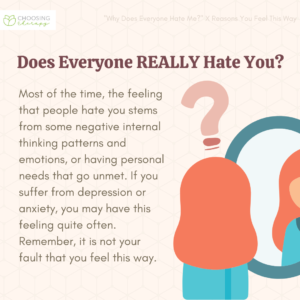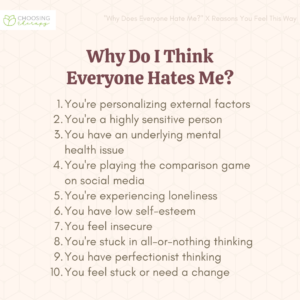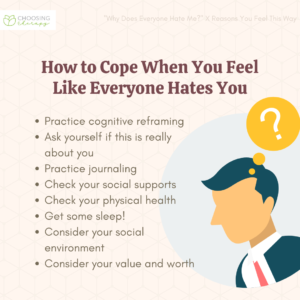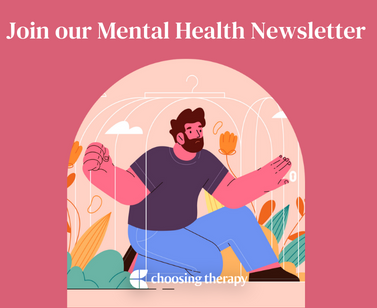Assuming that “Everyone hates me” is a pretty gloomy thought. Fortunately, it is highly unlikely that everyone around you actually hates you. These thoughts and feelings most likely stem from the way you feel and think about yourself. The fact is that you are valuable as a person and not everyone hates you.
Would like to feel less self-critical? Therapy can help. BetterHelp has over 20,000 licensed therapists who provide convenient and affordable online therapy. BetterHelp starts at $65 per week. Take a Free Online Assessment and get matched with the right therapist for you.
Does Everyone REALLY Hate You?
Most of the time, the feeling that people hate you stems from internalized negative thoughts and emotions, or even just being down because you have some unmet needs. If you suffer from depression or anxiety, you may have this feeling quite often. Remember, it is not your fault that you feel this way.
Additionally, your physical state can affect your emotional state, so be sure that you take care of your body. Before assuming everyone hates you, check in with yourself.
Consider the following potential roots of feeling like everyone hates you:
- Are you hungry?
- Are you tired?
- Are you hydrated?
- Have you relaxed lately?
Why Do I Think Everyone Hates Me?
Thinking that “Everyone hates me” typically points toward internal fears or maladaptive thinking patterns. The truth is that not everyone hates you, but you may feel this way because of how you view yourself. The thinking patterns we use to navigate the world around us sometimes backfire in this way, especially if those thinking patterns are not based on reality.
Below are ten reasons you may feel like everyone hates you:
1. You’re Personalizing External Factors
Personalization is one of the most common cognitive distortions people tend to have. This is when you view external factors or situations as having to do with you directly. This can reinforce negative thoughts you have about yourself by using unrelated situations as “evidence” to trick yourself into thinking that everyone hates you.
2. You’re a Highly Sensitive Person
Highly sensitive people tend to become stressed easily from direct or observed conflict. They may also get upset from observing the strong emotions or reactions of others. Because of this, if you’re a highly sensitive person, you may feel like people hate you when you’re really just overwhelmed.
3. You Have an Underlying Mental Health Issue
Anxiety, social anxiety, and depression can get you feeling down. Negative thoughts focused on your faults or mistakes are common with these disorders and can lead to feelings of worthlessness or assumptions that the world hates you. This, of course, is not based on reality; instead, it’s emotional reasoning that comes from these disorders.
4. You’re Playing the Comparison Game On Social Media
Watching the curated lives of others unfold on social media can be tantalizing, but it can also lead to feelings of inadequacy and unrealistic expectations that you can’t reasonably meet. This can cause poor self-esteem. When you don’t have as much interaction or response online, this can make you think everyone hates you.
5. You’re Experiencing Loneliness
Loneliness is about connecting with others, which is why you may feel lonely even when you’re surrounded by people. When you feel like you can’t connect with those around you, this may lead to a belief that they hate you. The truth is likely that you have not found the right people or a way to bond with them.
6. You Have Low Self-esteem
Feeling like everyone hates you possibly says more about how you feel about yourself. Suffering from low self-esteem can lead you to externalize the source of these negative views, surmising that people around you hate you.
7. You Feel Insecure
Insecurity stems from fear. A lot of the time, this fear relates to the idea of rejection. If insecurity overwhelms you, it can lead you to think everyone hates you, giving you a reason to avoid those things your insecurities impact.
8. You’re Stuck In All-or-Nothing Thinking
All-or-nothing thinking, or extreme thinking, is a cognitive distortion where you create a broad assumption based on little or no evidence, leading you to think you’re either all good or all bad. It doesn’t allow for any gray areas. For example, if you feel like you’re not the best, you’ll assume you’re the worst and everyone hates you.
9. You Have Perfectionist Thinking
Your self-imposed expectations may not permit you to have flaws, make mistakes, or be less than perfect. If you don’t live up to your own standards, you may feel like you’re not worthy and everyone hates you for your failings.
10. You Feel Stuck or Need a Change
Feeling trapped in a social or work situation that you don’t like may lead to resentment. You may feel the need for change or like something needs to be fixed. However, this resentment can lead to feeling like everyone around you hates you, which justifies your negative feelings about your environment.
Getting Therapy Is Affordable! BetterHelp – Online Therapy Starting At $65 Per Week “BetterHelp is an online therapy platform that quickly connects you with a licensed counselor or therapist and earned 4 out of 5 stars.” Visit BetterHelp Talkspace - Online Therapy With or Without Insurance Talkspace accepts many insurance plans including Optum, Cigna, and Aetna. Typical co-pay is $30, but often less. Visit Talkspace
How to Cope When You Feel Like Everyone Hates You
In order to cope with these feelings, you can try some self-care techniques as well as cognitive checks and exercises. These strategies include cognitive reframing, journaling, and checking in with your support system. Addressing the feeling that you are hated ensures making sure to take care of your body and mind.
Below are ways to cope with feeling like everyone hates you:
Practice Cognitive Reframing
Cognitive reframing is a technique where you take note of your thoughts and evaluate if they’re serving or hurting you. If the thoughts are harmful, consider whether there’s another way to look at your situation or a different perspective you can take. Many times, we get stuck ruminating on the same thing or problem if we approach it from the same view over and over.
Ask Yourself if This Is REALLY About You
Personalization is a common cognitive distortion that places the focus or reason for external situations on yourself.1 For example, you assume that everyone giggling on the bus is joking about how you’re dressed. This makes an unrelated, outside situation about you. A good first step is to recognize that others’ behavior may be motivated and focused on things outside yourself.
Practice Journaling
Process journaling can be helpful if you often find yourself believing the world hates you. Make a daily practice of journaling about situations that stand out to you, including what happened, how you felt, what you thought, and how you responded. Then, process whether the reaction was based on evidence or assumptions. This can help you reframe how you view your environment.2
Check Your Social Supports
Most people have a support system of some kind. But if this network isn’t very supportive, it can leave you feeling isolated. Occasionally, it’s a good idea to evaluate your friendships and relationships, making efforts to change the ones that do more harm than good. Positive support systems, consisting of family, friends, partners, and resources, show favorable effects on happiness.3
Check Your Physical Health
Your physical health and perception of it can impact your mood.4 Your overall outlook on life and your place in the world can become fairly bleak when you’re not feeling well. Sometimes, feeling hated is more reflective of feeling sick or unwell vs. people actually hating you. Make sure to practice self-care daily.
Get Some Sleep!
There is an undeniable link between sleeping patterns and your mental and physical health.5 To get better sleep, create a bedtime routine and avoid screen time an hour before bed. If you’re sleeping enough but still feel tired throughout the day, talk to your doctor about taking a test to see if you have a sleep disorder, such as sleep apnea. These may be impacting your sleep quality and mood.6
Consider Your Social Environment
Your surroundings can negatively affect your outlook, especially if you’re in a place that is unsupportive or makes you feel like you belong.7 A sense of not belonging can be interpreted as being hated but may be an indication that you don’t feel comfortable with or connected to anyone. While making a geographical relocation is not always possible, it may help to consider a move.
Consider Your Value & Career
If you feel trapped in a job or situation that makes you unhappy or provides little personal value, you might really feel more stuck than hated. Even being underappreciated at work can negatively impact your mood and outlook.8 Consider whether a change is needed. Talking to your boss about a raise could also make a big difference to your mood.
When to Seek Professional Help
Feeling like everyone hates you can become debilitating. That general assumption could also indicate that something more serious is going on, as feeling hated is a common symptom of anxiety, depression, and various personality disorders. If your everyday life is severely impacted, you have problems performing at work or school, or you start having thoughts of suicide, seek professional help.
There are many ways to find the right therapist to work with. If you have insurance, start by calling your provider to see if they cover mental health treatment. If so, get a list of in-network therapists in your area. Using an online therapist directory can also be helpful.
Betterhelp – Affordable, convenient, online therapy – Get 20% Off Your First Month
Final Thoughts
Feeling like everyone hates you can be related to a number of false beliefs about yourself or even a sign of underlying mental health issues. It is important to know that there are ways to cope with your feelings and find help. Practicing cognitive reframing, journaling, getting better sleep, considering your environment, or reaching out to a therapist can make a big difference.
To help our readers take the next step in their mental health journey, Choosing Therapy has partnered with leaders in mental health and wellness. Choosing Therapy is compensated for marketing by the companies included below. Online Therapy BetterHelp Get support and guidance from a licensed therapist. BetterHelp has over 20,000 therapists who provide convenient and affordable online therapy. Complete a brief questionnaire and get matched with the right therapist for you. Get Started Virtual Psychiatry Hims / Hers If you’re living with anxiety or depression, finding the right medication match may make all the difference. Connect with a licensed healthcare provider in just 12 – 48 hours. Explore FDA-approved treatment options and get free shipping, if prescribed. No insurance required. Get Started Reduce Drinking Sunnyside Want to drink less? Sunnyside helps you ease into mindful drinking at your own pace. Think lifestyle change, not a fad diet. Develop new daily routines, so you maintain your new habits for life. Take a 3 Minute Quiz Mental Health Newsletter A free newsletter from Choosing Therapy for those interested in mental health issues and fighting the stigma. Get helpful tips and the latest information. Sign UpAdditional Resources
For Further Reading
Online Anxiety Test A few questions from Talkiatry can help you understand your symptoms and give you a recommendation for what to do next. How Does ERP Help With Intrusive Thoughts? Obsessive compulsive disorder (OCD) is a psychiatric condition marked by the presence of obsessive thoughts, images, doubts, or urges, followed by compulsive behaviors or acts aimed at easing the distress caused by the obsession. While the content of the obsessions can take many forms, they are always repetitive, persistent, involuntary, and intrusive, and they often result in a great deal of anxiety for the person experiencing them.

Find a therapist for anger management
Get the help you need from a therapist near you
City or zip Search










